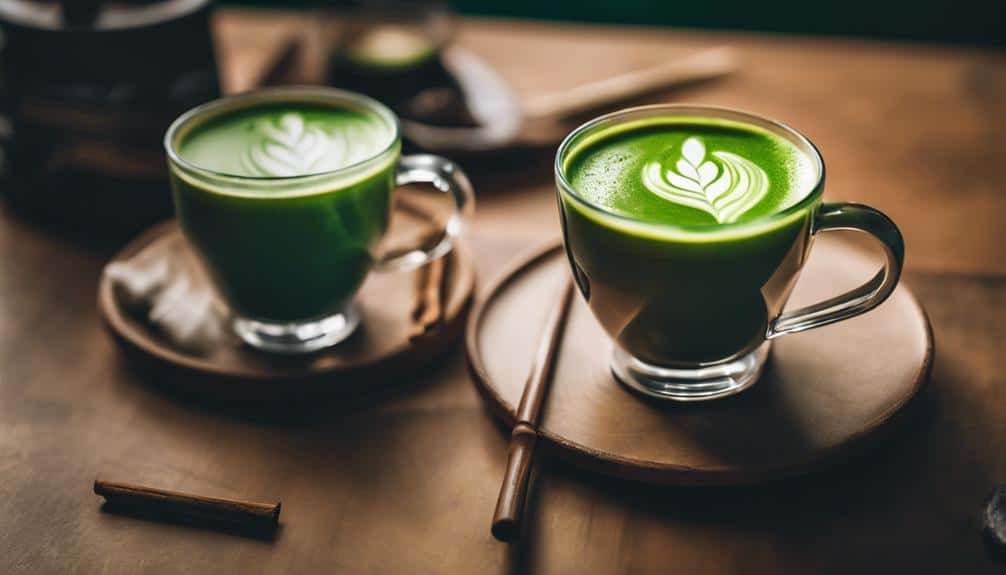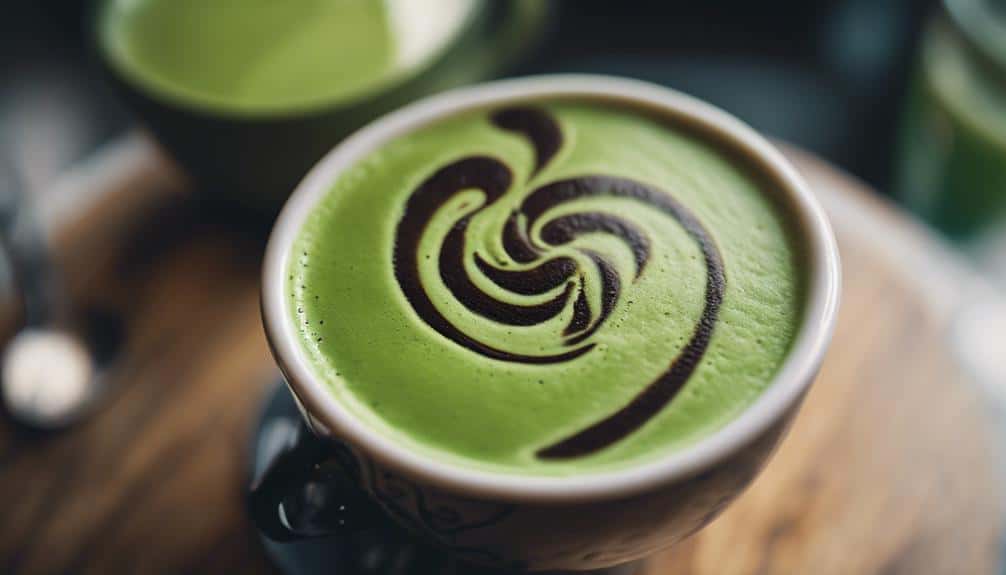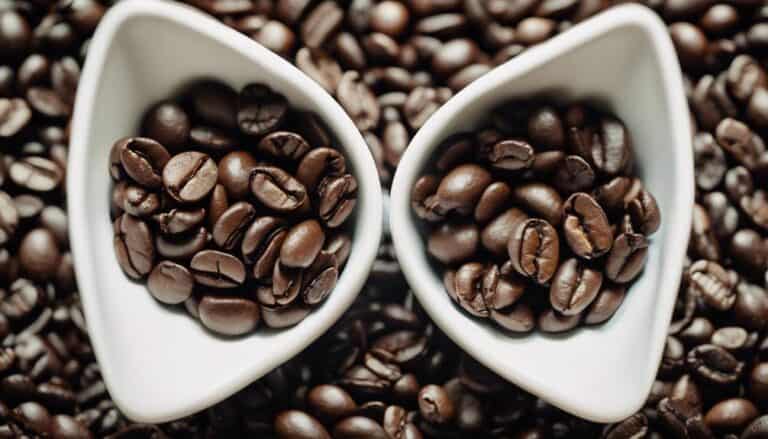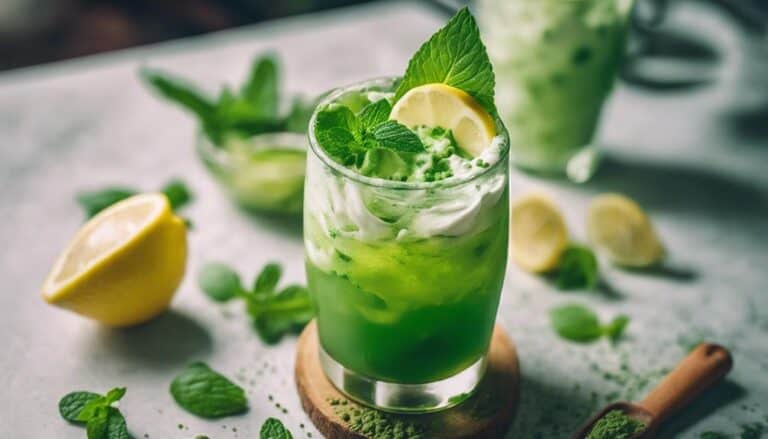Matcha Green Tea Vs Coffee: the Ultimate Caffeine Battle

As I took my first sip of Matcha green tea, I couldn't help but wonder how it would stack up against my morning coffee ritual. The subtle grassy notes and creamy texture of Matcha offered a unique experience, distinct from the bold, robust flavor of coffee. As I pondered the caffeine content and health benefits of each, a question lingered in my mind: which one truly reigns supreme in the battle for the ultimate caffeinated beverage? The answer might surprise you.
Caffeine Levels Comparison
Comparing the caffeine levels between matcha green tea and coffee reveals notable differences in their stimulating properties and potential effects on the body. Matcha tea contains around 35mg of caffeine per 8oz serving, which is markedly lower than the 70-140mg found in coffee. This stark contrast positions matcha as a milder option regarding caffeine content compared to the robust jolt provided by coffee.
The presence of L-theanine in matcha plays a vital role in how caffeine is processed, leading to a sustained release of energy, unlike the rapid spike and crash often associated with coffee consumption. While coffee can sometimes trigger jitters, anxiety, and disrupt sleep patterns due to its higher caffeine content and quicker absorption rate, matcha offers a more balanced and gentle lift in energy levels.
Understanding these differences in caffeine delivery can shed light on the potential side effects and impact on overall well-being associated with each beverage.
Health Benefits Analysis
Matcha tea's abundant antioxidants offer a significant boost to the immune system and overall health, distinguishing it from coffee in regard to health benefits. The high levels of antioxidants in matcha help combat free radicals in the body, promoting better overall health. Additionally, matcha contains L-theanine, an amino acid that works synergistically with caffeine to provide a sustained energy boost without the jitters commonly associated with coffee consumption. This unique combination also contributes to stress reduction and relaxation, further enhancing the health benefits of matcha tea.
On the other hand, coffee does offer some health benefits due to its polyphenols and essential vitamins, such as B2 and B5. However, excessive coffee consumption can lead to dehydration and potential negative effects on the digestive system. In contrast, matcha tea's umami taste profile and rich history in traditional tea ceremonies add a cultural dimension to its health benefits, making it a well-rounded choice for those seeking a healthier caffeine option.
Flavor Profile Examination

Exploring the diverse flavor profiles of matcha tea and coffee reveals a spectrum of taste experiences influenced by factors such as origin, preparation methods, and individual preferences.
Matcha tea, known for its vibrant green color, offers a unique sensory experience with an umami taste and a rich, earthy flavor profile. The matcha taste is distinctive, featuring a grassy, sweet flavor complemented by earthy notes, making it a popular choice among tea enthusiasts.
On the other hand, coffee presents a wide range of flavor profiles, from bold and bitter to fruity and floral, depending on the origin of the beans and the roast level. The flavors of coffee can also be influenced by brewing methods and additions like milk or sugar. Coffee enthusiasts appreciate the variety and complexity of coffee flavors, which can cater to different taste preferences.
Performance and Focus Enhancement
Matcha green tea offers mental clarity benefits through its unique combination of L-theanine and caffeine, promoting relaxation and sustained focus.
While coffee provides a quick alertness and energy boost, it can sometimes lead to jitteriness and anxiety, potentially hindering cognitive function.
The balanced energy release and calming effects of matcha make it a valuable choice for enhancing cognitive performance and maintaining focus throughout the day.
Mental Clarity Benefits
Enhancing cognitive function can be achieved through the consumption of substances like L-theanine found in certain beverages. Matcha green tea, containing L-theanine, promotes mental clarity, focus, and cognitive performance by increasing alpha wave activity in the brain. This leads to a state of relaxed alertness, enhancing attention span and reaction time.
The combination of caffeine and L-theanine in matcha provides sustained mental clarity without the jitters or crash often associated with coffee. While coffee offers a quick energy boost, it may lack the same level of sustained focus and mental clarity that matcha provides. Opting for matcha can support improved cognitive performance and enhance overall mental well-being.
Alertness and Energy
When comparing the effects of matcha green tea and coffee on alertness and energy levels, it's evident that the sustained release of energy from matcha provides a more balanced and steady enhancement without the typical side effects associated with coffee.
Matcha tea, containing L-theanine, offers sustained energy, promoting focus and alertness throughout the day. In contrast, coffee's immediate energy boost can lead to jitters, anxiety, and disrupted sleep patterns.
The slow caffeine release in matcha helps in enhancing performance steadily, while consuming coffee may cause adrenaline spikes and subsequent crashes, affecting long-term alertness and performance.
Matcha's combination of caffeine and L-theanine provides a smoother and more sustained energy enhancement compared to the abrupt effects of coffee.
Cognitive Function Improvement
In considering cognitive function improvement, particularly in performance and focus enhancement, the interplay between the components in matcha green tea and coffee reveals distinct effects on mental acuity and productivity.
Matcha green tea stands out for containing L-theanine, which aids in stress reduction and promotes relaxation, leading to enhanced focus and attention span. On the other hand, coffee, with its higher caffeine content, offers a quick cognitive performance boost.
While both beverages contribute to improved mental alertness and overall cognitive function, regular consumption of matcha green tea may provide additional benefits for long-term memory retention. The combination of L-theanine and caffeine in matcha green tea seems to support a balanced approach to cognitive enhancement, emphasizing sustained focus and cognitive performance over time.
Cultural Significance Exploration
When comparing the cultural significance of matcha green tea and coffee, historical origins play an essential role in understanding their respective traditions.
Matcha is deeply rooted in Japanese tea ceremonies, emphasizing mindfulness and respect for the ritual.
On the other hand, coffee has diverse cultural influences, ranging from the espresso culture in Italy to the rich history of Turkish coffee ceremonies.
Historical Origins Comparison
Comparing the historical origins of matcha tea and coffee reveals their deep cultural significance and global impact.
- Matcha Tea: Originating in ancient China and Japan, matcha tea holds a central role in Japanese tea ceremonies, symbolizing harmony, respect, and tranquility. Its sustainable production through shade-grown cultivation and minimal processing reflects a deep connection to nature and mindfulness.
- Coffee: With roots in Ethiopia, coffee has become a global phenomenon, playing a significant role in intellectual and social gatherings worldwide. Its rich history intertwines with the exchange of ideas, fostering creativity and stimulating conversations. Coffee has transcended borders, becoming a staple in various cultures and traditions, embodying energy and vibrancy in everyday life.
Rituals and Traditions
Exploring the intricate rituals and time-honored traditions surrounding matcha tea and coffee reveals their profound cultural significance and enduring legacy. Matcha tea holds a deep cultural significance in Japan, deeply rooted in traditional tea ceremonies and Zen Buddhist practices.
On the other hand, coffee boasts a global presence with diverse preparation methods and cultural rituals like espresso and Turkish coffee ceremonies. Matcha tea production often prioritizes sustainability compared to coffee farming practices, making it an environmentally friendly choice.
Despite this, matcha tea is gaining popularity in the West while maintaining its cross-cultural appeal, blending Asian traditions with Western influences. Coffee, with its historical significance in social and intellectual gatherings, continues to be a beloved global beverage with its own rich tapestry of customs and traditions.
Influence on Society
The cultural significance of matcha tea and coffee extends far beyond mere beverages, shaping societal norms and practices worldwide. Here's how these beverages influence society:
- Traditional Ceremonies: Matcha tea is deeply ingrained in Japanese culture through traditional tea ceremonies, promoting mindfulness and relaxation. In contrast, coffee has been historically significant in various global social gatherings, symbolizing energy and productivity.
- Global Influence: While matcha's influence remains rooted in Japanese values of harmony and tranquility, coffee's global influence transcends borders, impacting cultural practices across different societies.
- Sustainability: Matcha production often adopts shade-grown cultivation, promoting sustainability by reducing the need for pesticides. This eco-friendly approach contrasts with some coffee farming practices, making matcha a more environmentally conscious choice.
Environmental Impact Evaluation
Matcha tea's environmentally conscious production methods position it as a more sustainable choice when considering its impact on the ecosystem compared to coffee cultivation practices. Matcha production involves shade-grown cultivation, which reduces the need for pesticides and promotes eco-friendly practices. On the other hand, coffee farming can contribute to deforestation and habitat loss, negatively impacting the environment. The minimal processing and cultivation methods of Matcha make it a sustainable option, whereas coffee production requires significant water, energy, and resources, leading to environmental concerns.
| Aspect | Matcha Tea | Coffee |
|---|---|---|
| Water Consumption | Lower due to shade-grown cultivation | Higher due to irrigation needs |
| Energy Usage | Minimal processing methods | High energy requirements for processing |
| Environmental Impact | Reduced due to eco-friendly practices | Can contribute to deforestation and habitat loss |
Ultimate Winner Declaration

In the comparison between matcha green tea and coffee, the ultimate winner is clear for those seeking a healthier caffeine option. Matcha tea contains lower caffeine content, providing a sustained energy release that surpasses the immediate jolt of coffee.
Here's why matcha emerges as the champion:
- Sustained Energy Release: The slow release of caffeine in matcha, combined with L-theanine, offers a balanced energy boost that lasts longer without the crash associated with coffee.
- Antioxidants and Health Benefits: Matcha is packed with antioxidants, promoting overall health and well-being. It also aids in stress reduction, offering a holistic approach to caffeine consumption.
- Unique Sensory Experience: Beyond its health benefits, matcha provides a sensory experience that engages multiple senses, making the act of consuming caffeine more enjoyable and mindful.
Choosing matcha over coffee not only supports sustained energy but also contributes to a healthier lifestyle with its array of benefits.
Conclusion
To sum up, while both Matcha green tea and coffee have their own unique benefits and flavors, Matcha emerges as the healthier and more balanced choice in the ultimate caffeine battle.
With its lower caffeine levels, antioxidant-rich profile, and cultural significance, Matcha offers a mindful and holistic caffeine experience that supports overall well-being.
Whether you're looking for sustained energy release, mental clarity, or a moment of relaxation, Matcha green tea is the ultimate winner in this caffeine showdown.





